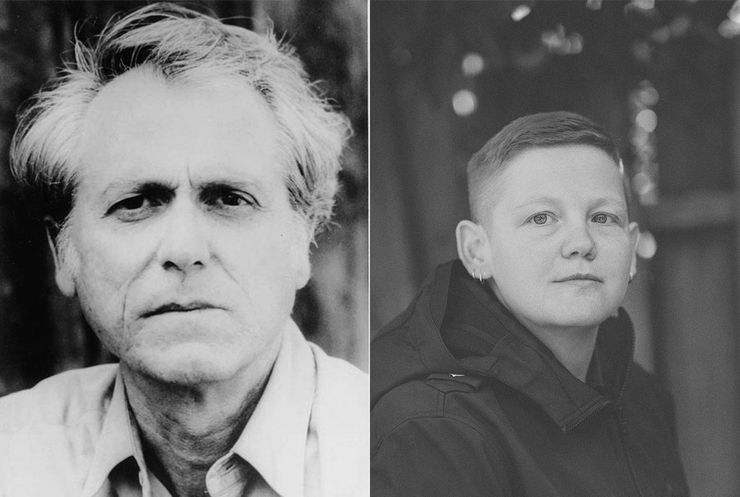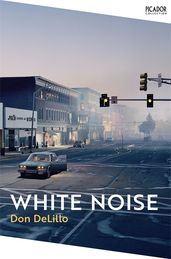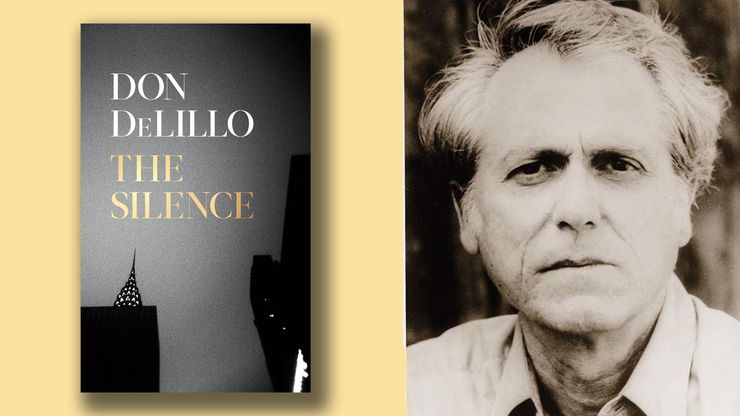Don DeLillo and Kae Tempest discuss novels, America and more
Eavesdrop on two literary greats discussing the purpose of a novel, what they would never write about, and what our current times mean for literature.

Don DeLillo is one of America’s greatest living writers. His postmodern masterpiece White Noise saw him gain widespread recognition in 1985, and in the decades that followed he established himself as a cornerstone of American writing. Today, he remains renowned for eerily prescient works that tackle prodigious themes yet pinpoint emotion and humour with intense clarity.
To mark White Noise's inclusion in Picador Collection, Kae Tempest, poet, playwright and musician, interviews him as one of their literary heroes. Listen as they discuss the purpose of fiction, DeLillo’s long career and his thoughts on the future of America. If you're looking to dive into DeLillo's work but not sure where to get started, discover our beginner's guide to Don DeLillo's books, here.
Kae Tempest: What is the purpose of a novel?
Don DeLillo: The immediate purpose is to satisfy the writer’s need to express themselves. He has to write, she has to write. Why does it take this particular form? I guess it goes back to ancient storytelling, which can be poetry and can be fiction of a kind. I started with short stories. I wasn’t even remotely ready to write anything longer. And my short stories were quite limited in scope. They were geographically limited – I came from a certain area in the Bronx and that’s what I wrote about. And eventually, the focus expanded and it really happened in the course of writing my first novel. The novel taught me how to write and it took forever. It took thirty years I think, and when it was done I felt I was a writer. Which was an enormous kind of gratification for me because I hadn’t known this.
‘[My first] novel taught me how to write and it took forever. It took thirty years I think, and when it was done I felt I was a writer. Which was an enormous kind of gratification for me because I hadn’t known this. ’
— Don DeLillo
Kae Tempest: A lot has been said about how prescient your books are, but I’d say it’s less that you’re telling a future and more that you’re so rooted in noticing the present that it seems prescient but it’s just present.
Don DeLillo: That’s actually true. This was more evident to me when I was writing The Names because I was living in Greece and there was turmoil everywhere in the area and within Greece: terrorism and other aspects. Revolutions, refugees from other countries in Athens. And there was a kind of boiling excitement in that part of the world. And I wrote about it and I think to many readers in other countries this seemed to be prophetic but it wasn’t. I was just observing as usual – and I’ve certainly never felt prophetic.
Kae Tempest: Do you feel that you’re still tuned in at that frequency in terms of what you could say about where we are now, the times we are in and maybe what that means for literature?
Don DeLillo: I can speak only about the novel, and I don’t think it’s going anywhere. Young writers still have that same urge to write fiction of a certain length, to write stories of a certain length. I think the novel is still strong and I think there are many good, young writers practising that form. What about the times we live in? There seems to be a kind of fractured culture, speaking about America and its involvement in other countries. There’s something inconsistent about it, something that doesn’t satisfy the set of puzzles on the board. There’s something missing, and I don’t know quite what it will lead to but I’m not extremely optimistic about the American future.
‘There seems to be a kind of fractured culture, speaking about America and its involvement in other countries. There’s something inconsistent about it . . . and I don’t know quite what it will lead to but I’m not extremely optimistic about the American future. ’
— Don DeLillo
Kae Tempest: In your novels, there is a noticing of the everyday that is so perfectly, so tunefully described that something very usual becomes eerie, oppressive. For example, there’s a line from White Noise where you write ‘On telephone poles all over town there are homemade signs concerning lost dogs and cats, often in the handwriting of a child.’ Which is such a beautiful and usual thing to see, but to suddenly be reminded of it in fiction . . .
Don DeLillo: I was desperate to begin a novel at that point. I guess it was 1982 or 1983. A long time had passed and I wanted to get back to work. And I just started describing streets and signs on poles. I started noticing them, they were always there, but I not only noticed them, I looked at them, thought about them and thought about the people involved. And that’s how White Noise got started. I still notice. What I notice mainly in Manhattan is people, people and traffic. And what can people make of that? This is the stuff of fiction. In Zero K, the young narrator does describe such things. He has a kind of highly sensitive apparatus of perception and he sees these things quite clearly, and I don’t know what he makes of them ultimately except they’re worth writing down, worth thinking about, worth noticing. That’s pretty much what my experience was, in my years in Manhattan, and still is. I see the traffic, I hear the noise, I see the scaffolding and construction everywhere – at street-level, underground, they’re still building a subway on the east side of Manhattan. And then the tall buildings that are totally absurd in this landscape. The city is changing physically, and I think in other ways as well.
‘What I notice mainly in Manhattan is people, people and traffic. And what can people make of that? This is the stuff of fiction.’
— Don DeLillo
Kae Tempest: Do you think that literature and art and movies have a role in helping us to see ourselves? So often we can’t recognise our own behaviour until we read it, or it’s beamed back at us somehow. I find that so much with your work, that it beams reality straight back so that you can’t hide.
Don DeLillo: As you know, sitting at a desk, or wherever you sit when you write, you don’t know what’s going to happen. In my own case, I see rooms, I see the street and the traffic and that sort of thing, and then it just transfers itself to my fingertips as I type on this old battered typewriter which I enjoy using. At this point in my writing life, there’s a line that goes backwards to when I started. And it all seems to be contained in the moment in which I’m now working somehow, it’s all compressed between that. Why did this novel, Zero K, take so long to write? Well, I’m older, but I think it’s also quite challenging. But it’s not something I feel in a worrisome way, the challenge. It’s there but I just decide I’m going to accept it and move forward. I don’t worry about it, I don’t think I worry about meeting the challenge, I just do it.
‘So often we can’t recognise our own behaviour until we read it, or it’s beamed back at us somehow. I find that so much with your work, that it beams reality straight back so that you can’t hide.’
— Kae Tempest
Kae Tempest: It’s interesting that you talk about the line that goes backwards through the other works because last night you mentioned that when you’re at the typewriter you’ll write one paragraph on a whole page so you can see what the words are doing. And immediately I thought, do you have the manuscripts at home somewhere for all those novels, with all the paragraphs on separate pages?
Don DeLillo: Those pages exist. The only one that’s at home is the most recent, Zero K. Which is a huge stack considering the novel is only an average size, less than average. In an archive at the University of Texas they have a famous archive with manuscript and documents by James Joyce and Yeats and others, and I thought, well, that would be a nice place for them.
Kae Tempest: In your novels there is such an attention to speech. Sometimes it feels like such a game between the characters, between you and the characters, between you and us. I wondered if, after fifteen novels, of paying such close attention to a speech that you create, if you’re ever still surprised by what people say to you in life?
Don DeLillo: I notice patterns that people may use in their speech, and I have a feeling that I used to notice actual dialogue more acutely than I do now. I think I paid more attention to expressions that people use, the way that people spoke. Unless they’ve stopped being as individualistic as they used to be. Could that be it? Could it be the internet, something like that that has changed speech patterns? I’m not sure, but I have to admit that I don’t quite notice the details or the idiosyncracies the way I used to.
Kae Tempest: Is there anything unwritable? Something you want to keep in life and not take to fiction?
Don DeLillo: That’s a good question. The first thing to say is I wouldn’t consider taking it to fiction unless it prompted me to. There are things, maybe a death in the family or something, that I have no intention of writing about so it doesn’t become a question of choosing to do it against my better judgement.
Kae Tempest: Who are you writing for?
Don DeLillo: Myself. I don’t have an audience in mind ever or an individual. It’s never worked that way. I know other writers do feel that they’re writing for someone but I don’t know who the reader is; even after publishing all these books I’m not sure.
Kae Tempest: Are you writing for young Don, or the Don right now?
Don DeLillo: No, I’m writing for the current novelist and I’m following my impulses that are untrainable. This is what’s there. And is it possible that nothing will be there from this point on? It’s possible of course. I’ve known other writers who have stopped willfully, or because they just ran out of ideas and characters.
Kae Tempest: I read a line in Underworld that really struck me: ‘longing on a large scale is what makes history.’
Don DeLillo: That line has been questioned by somebody writing about the book. What I was thinking of is the way entire nations might feel a longing for lost territory from a hundred years ago. And that’s what makes history, meaning that’s why they’re launching an invasion, to get back their old land. That’s just a specific example, but I think in general there is some truth to that kind of longing and its importance in the world – geographically, historically, in all sorts of ways.
Kae Tempest: With that line echoing between us, are you hopeful for the future?
Don DeLillo: I’m not particularly hopeful. If you’d asked me this ten years ago I would have said I’m neither hopeful nor pessimistic. But now I’m a little pessimistic I think. I don’t think things have gone so well in the US and we see war everywhere, conflict everywhere of one kind or another – religion, race, nationality, tradition, history. It’s a mistake to think it’s all happening at once but it sometimes seems that way. There are also many conflicts that we don’t know anything about because they’re not covered, they’re not part of the media because they’re too small, they’re too remote and perhaps too dangerous for people to report on. And one could say this is human nature, there seems to be more human nature than there normally is.
Kae Tempest: Given your expertise in extracting the essence of life, I wonder if you are any closer to understanding the essence of life?
Don DeLillo: The quick answer is no. There may be something in the drawn-out act of fiction, writing a novel – two or three or four years’ worth, that draws a writer closer to people he knows and people in general, but I don’t know if this is something I can articulate, I don’t know if it’s something I could ever write an essay about or answer your question directly and immediately. There must be something there that I would not know if I hadn’t been writing fiction all these years, about people, about humans. It’s a vast subject, but how do we try to encompass all this in a few sentences, a few pages? In a curious way, you can think of a novel as camouflage, it’s a way in which a writer can explore his feelings about people without being specific about himself or certain individuals. I never thought of that before actually, so it’s your fault!
‘You can think of a novel as camouflage, it’s a way in which a writer can explore his feelings about people without being specific about himself or certain individuals.’
— Don DeLillo
Kae Tempest: If you were to offer some advice either to thirty-year-old Don or to a young writer one or two novels into their career, is there anything that comes to mind that you would say?
Don DeLillo: Based on my own experience I would say keep writing. If it doesn’t go well just keep doing it. If it’s never going to go well you will know that sadly: that’s what I believe. I get mail from readers – a number of them have said they’ve given up, they had no choice so they had to, and I think that is the choice. Otherwise, I believe a would-be writer’s life would be damaged to some extent.
Image credit: Joyce Ravid and Julian Broad
White Noise
by Don DeLillo
Possibly DeLillo’s funniest book, White Noise introduced his work to a wider audience than ever before and established his reputation as a master of postmodern fiction.
Jack Gladney is the creator and chairman of Hitler studies at the College-on-the-Hill. The novel is a story about his absurd life; a life that is going well enough, until a chemical spill from a rail car releases an 'Airborne Toxic Event' and Jack is forced to confront his biggest fear – his own mortality. DeLillo's bestselling story effortlessly combines social satire and metaphysical dilemma, exposing our rampant consumerism, media saturation and novelty intellectualism.
Paradise
by Kae Tempest
An old wartime hero and injured outcast, Philoctetes has been stranded on a remote island for ten years. When a young soldier arrives with tales of Philoctetes past victories, he sees a chance for escape. However, things aren't as simple as they first appear, with hope begetting suspicion and the re-appearance of an old enemy tempting Philoctetes towards an act of revenge.
Widely acclaimed as a a revolutionary force in British poetry, music and theatre, Kae Tempest expands their range of work further with this contemporary take on Sophocles' Philoctetes in a bold new translation, demonstrating Kae's gift for finding modern-day relevance in ancient tales.




